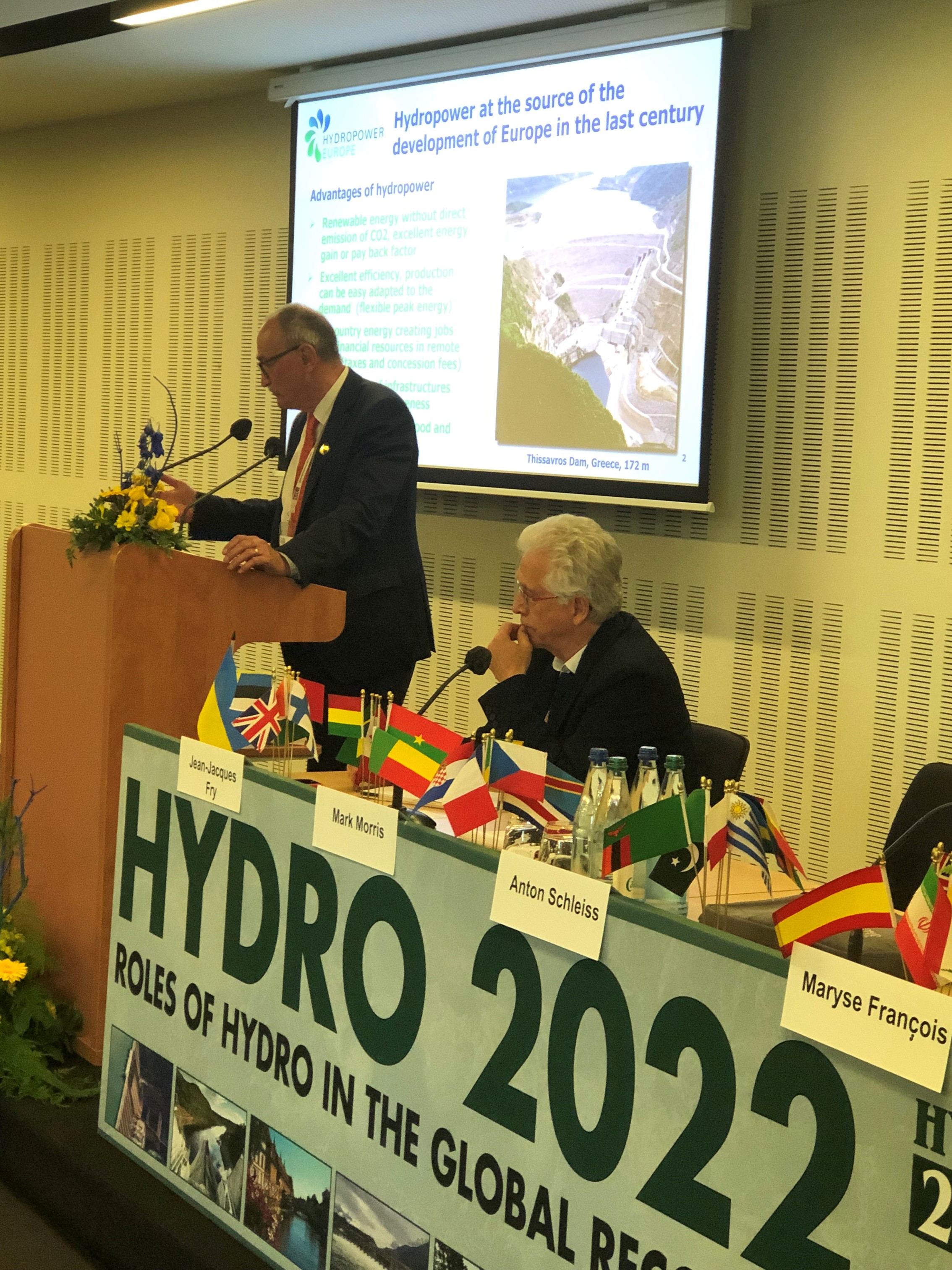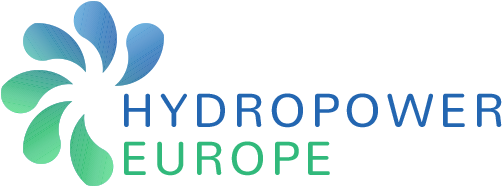Latest News
HYDRO 2022 Strasbourg: How to promote future hydro development in Europe with a sustainable impact?
The HYDROPOWER EUROPE project (2018-2022), funded from the European Union's Horizon 2020 research and innovation program, has released its final deliverables: a Research and Innovation Agenda (RIA) and a Strategic Industry Roadmap (SIR) for the hydropower sector. The challenge is to have a permanent voice through a forum gathering all hydropower stakeholders in order that the EU can use the RIA and SIR recommendations in making decisions supporting hydropower contributions to the clean energy transition. The purpose of this special session was to discuss the question of how the future development of hydropower in Europe can be promoted in a sustainable way.
« Is hydropower supported by enough funding for Research and Innovation and with regulation that can allow enough flexibility and storage in Europe by 2050? » asked J-J Fry, chairing this session with Mark Morris on behalf of HYDROPOWER EUROPE.
Prof. Anton Schleiss, on behalf of the HYDROPOWER EUROPE coordination team, firstly identified that only 65% of the economically feasible hydropower potential is currently tapped in Europe but this could be increased by at least 10% through technical and environmental upgrading in the next 10 years. To help implement this increase in generation, the RIA, recently released by the HYDROPOWER EUROPE Forum (www.hydropower-europe.eu) which Prof Schleiss coordinated, listed recommended funding for the most pertinent research themes needed to address 5 crucial challenges:

To identify these priorities, the HYDROPOWER EUROPE project also used a global system analysis of hydropower in Europe which identified two critical levers to help effect change, namely: reservoir volume and public awareness of hydropower.
A Strategic Industry Roadmap (SIR) was the second key deliverable of the HYDROPOWER EUROPE Forum which pointed out three key directions to help remove non-technical barriers to promote hydropower development:
- Providing economic and legal support for effective hydropower contribution to flexibility and storage within the new electricity system in the Net Zero Economy.
- Raising public awareness, increasing societal resilience and local employment.
- Preserving biodiversity and improving river ecosystems.
Maryse François contributed with Jean-Jacques Fry to promote and rate the key Parameter Indicators of hydropower under the umbrella of the European Technology Innovation Platform (ETIP) Smart Networks for Energy Transition (SNET). She demonstrated that hydropower can provide the largest range of services (compared to other technologies) to the new electric system. Moreover, she emphasized that hydropower provides the best return on energy, with amongst the lowest carbon release, material consumption and lowest price. Moreover, hydropower is a territory and water asset (revenues, irrigation, water supply, flood control, navigation, recreational area etc.) and a service provider for the grid. On the other hand, it is a long term solution requiring innovation to shorten this duration. But the future huge need for storage, which in 2018 hydropower provided 94% of, requires more pumped storage (PSH), for which the CAPEX over 80 years is the most competitive (Pumped Storage Hydropower Capabilities and Costs Capabilities, Costs & Innovation Working Group IHA September 2021). From an environmental view point, PSH requires far less surface area than the equivalent land space that would be needed for batteries holding a similar capacity. With such qualities why is PSH not developed in Europe as in China: today more than 30 GW installed (25% of the world capacity), 62 GW announced by 2025 and 120 GW by 2030?
Mark Morris, explained how the future development of hydropower in Europe could be promoted in a sustainable way. The HYDROPOWER EUROPE consortium has just been awarded funding under the recent Horizon Europe Call CL5-2021-D3-02-15 to build a European Technology Innovation Platform (ETIP) on HYDROPOWER which will be funded by the EC for three years. This will commence in Autumn 2022. The ETIP HYDROPOWER will allow:
- Direct representation & participation of hydropower within the SET Plan, giving a unified voice to the European Commission
- Closer integration and development of hydropower with other clean energy sources via collaboration with different ETIPs
- Consultation (2022/23) with industry to define and refine the focus, structure and balance of the HYDROPOWER EUROPE Forum
- A phased introduction of the Forum services (R&I facilitation, unified representation etc.)
- Implementation of a financially sustainable European Hydropower Forum in 2025.
He introduced key points on how research initiatives with high industrial interest within the European context could be coordinated and supported through:
- No duplication of existing associations
- Defining clear goals and objectives showing how industry can be engaged
- Demonstrating clear value for money
- Providing a realistic and viable pathway and schedule for implementation
To demonstrate clear value for money, he proposed 3 types of services facilitating research for industry and supporting easier more cost effective access to R&D funding. These comprised:
- Participation in a small projects programme
- Facilitating collaborative R&I actions between industry partners
- Tracking and flagging National, European & International research funding opportunities
In conclusion, the ETIP HYDROPOWER is a unique opportunity to provide a unified voice to Europe, promote hydropower development and to facilitate technical and environmental research for the industry sector. The ETIP offers a stepping stone towards creating a sustainable HYDROPOWER EUROPE Forum through which these goals may be achieved.

Anton Schleiss and Jean-Jacques Fry during Hydropower Europe's Session at Hydro 2022 in Strasbourg
Latest News
EVENT: Developments and biodiversity of watercourses. 8-10 November 2022
"Aménagements et biodiversité des cours d’eau" (EN: "Developments and Biodiversity of watercourses") is a conference organised by the Societé Hydrotechnique de France (SHF), next 8-10 November 2022 in Strasbourg, France. About the confere...
CONFERENCE: "QUO VADIS? Innovation potential of Hydropower" 27 - 28 October 2022
"QUO VADIS? Innovationspotential der Wasserkraft" (Innovation potential of Hydropower) is a conference organised by IBI- Kompetenz, the multidisciplinary platform for e...
JOINT LETTER: Renewables displace fossil fuels - the Innovation Fund must recorgnise this
Joint letter signed by: Bioenergy Europe, the European Heat Pump Assocition (EHPA), the European Renewable Energies Federation (EREF), the European Solar manufacturing Council (ESMC), the European Solar Thermal Electricity Association (ESTELA), Solar Heat Europe (ESTIF), Solar Power Europe, the A...
ETIP HYDROPOWER EUROPE: The permanent and common voice of Hydropower in Europe
ETIP Hydropower Europe (ETIP Hydropower) is a new project in the EU programme ...
Prof. Anton Schleiss at the 7th IAHR Europe Congress (Greece)
Prof. Anton Schleiss, from the International Commission on Large Dams (ICOLD - CIGB), was invited as a keynote speaker for the opening session og the ...
Hydro Power Industry Guide 2021/22 by VGBE
After the success from "Hydro Power Industry guide 2020/21", our colleagues from VGBe wanted to offer us the new guide from this year: “Hydropower Industry Guide 2021/22”. vgbe´s ...
POSITION PAPER: Hydropower as a catalyst and facilitator for the clean, safe and independent energy transition in Europe.
Key Messages: Given Europe’s ambition to raise the renewables target to 45%1 hydropower is critical to ensure Europe’s energy system has the necessary renewable electricity and flexibility to protect grid stability from intermittent renewable energy, to sustain the gr...
NEW PUBLICATION, Hydroscience Journal: "Hydropower, a catalyst for energy transition in Europe"
On the context of HydroES 2021 (22 September 2021), Hydropower Europe had the chance to present its vision and results achieved during three years of consultations. Some of the conclusions are: Hydropower still has a great potential for development Hydropower sector needs...
HYDRO 2022 Strasbourg: How to promote future hydro development in Europe with a sustainable impact?
The HYDROPOWER EUROPE project (2018-2022), funded from the European Union's Horizon 2020 research and innovation program, has released its final deliverables: a Research and Innovation Agenda (RIA) and a Strategic Industry Roadmap (SIR) for the hydropower sector. The challenge is...
Webinar 28 february 2022: What Research and Innovation are Needed to Tap More Hidden Hydro Opportunities in the Future?
The IEA Technology Cooperation Programme (TCP) on Hydropower (also known as IEA Hydro) is a working group of the International Energy Agency's member countries and others that have a common interest in advancing hydropower worldwide. Under the work programme Annex XVI...




